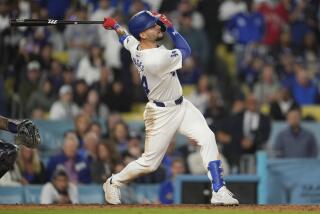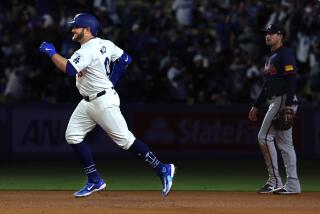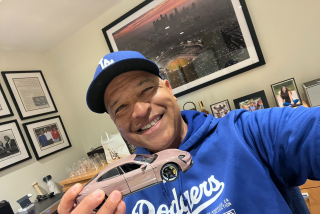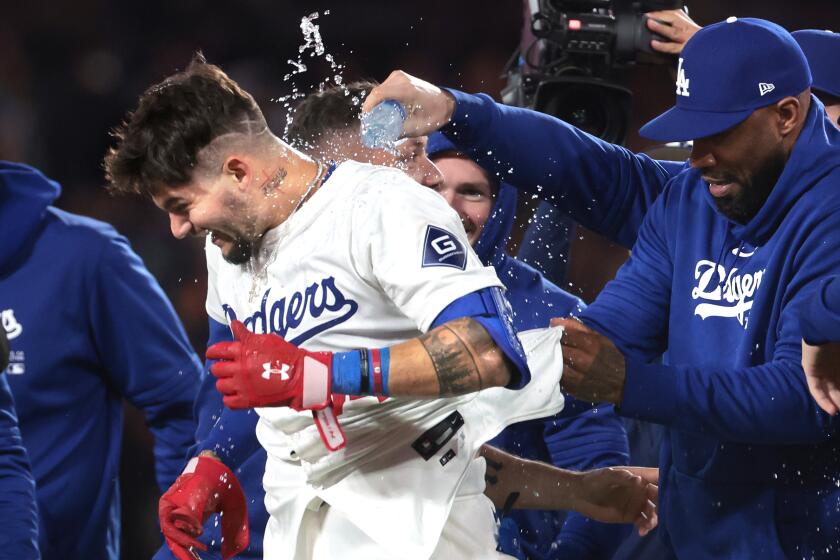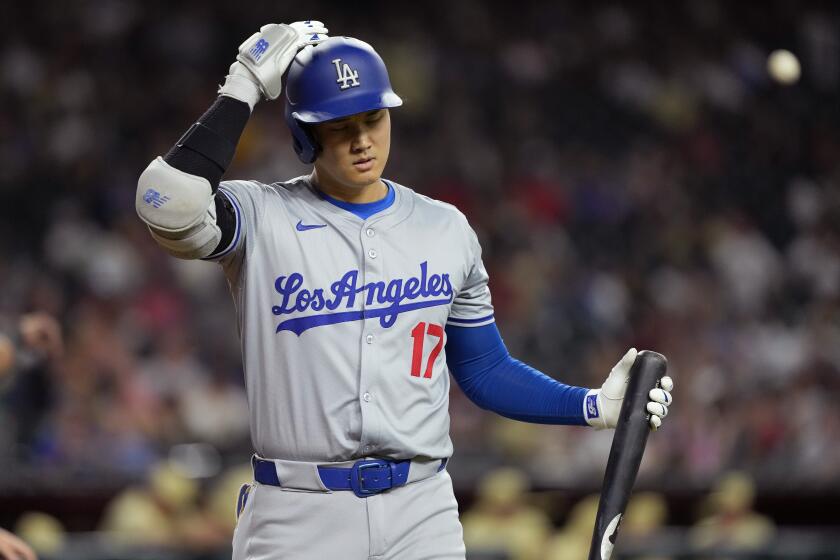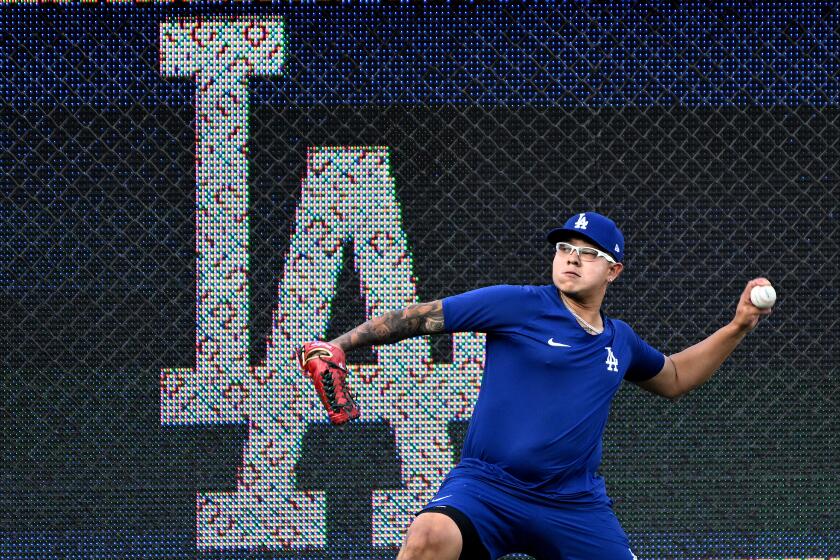It’s a Signing of the Times for Payroll-Sensitive Evans
The ultimate objective for the Dodgers in trading Eric Karros and Mark Grudzielanek was to secure a measure of financial and roster flexibility -- the new password at Dodger Stadium -- and improve their 2003 production at first base, the power position from which Karros hit only 28 home runs the last two years.
How did they do?
Well, selecting from a limited market while constricted by their determination to remain under the $117-million payroll tax threshold (you don’t suppose Kevin Brown or Darren Dreifort have paused in their therapies and thought about reworking their contracts to help management improve the team?), they fulfilled their objective about as well as they could.
Of course, some will categorize Fred McGriff as a consolation prize compared to Cliff Floyd, but he is far more than that, and his one-year, $3.75-million contract in the context of where the Dodgers are represents bargain dollars and bountiful sense.
In fact, it could be argued that the agreement was the most sensible of a day on which the Atlanta Braves, in a pure salary dump, allowed the division rival Philadelphia Phillies to steal 18-game winner Kevin Millwood (for catching prospect Johnny Estrada) and the New York Mets stretched to a puzzling four years and $26 million in acquiring Floyd, though neither the Dodgers, at about $15.5 million, nor Baltimore Orioles, around $19 million, had offered more than three years.
Give Dan Evans credit.
As much as Dodger Manager Jim Tracy lobbied for Floyd, because of their relationship in the Montreal Expos’ system, the general manager maintained that if Floyd truly wanted to play for the Dodgers it would have to be on their terms, the club would not exceed the tax threshold.
Ultimately, money talked.
Coming off a four-year, $19-million contract and having rejected an offer of salary arbitration from the Boston Red Sox, Floyd decided he could always chat with Tracy by phone and opted for the considerably larger Met offer.
Make no mistake: At 39, McGriff doesn’t have the speed or upside of the 30-year-old old Floyd, but he is a true first baseman (although not exactly the golden J.T. Snow, but then neither was Karros, of course) and his familiarity around the bag (some Dodger officials worried about Floyd’s lack of it) could prove important considering that the rest of the infield includes the untested Joe Thurston, the still inexperienced Cesar Izturis and the sometimes erratic Adrian Beltre.
In addition, now just 22 homers shy of 500 (and don’t think the Dodgers aren’t salivating at the marketing prospects), he has been the epitome of 30-homer, 100-RBI consistency, even while playing for the woeful Tampa Bay Devil Rays and even as he approaches his 40th birthday.
He has hit 32, 27, 31 and 30 homers in the last four seasons, driving in 104, 106, 102 and 103 runs. If the Crime Dog doesn’t approach those figures again, William Bratton may investigate.
“We’re not asking him to do anything he hasn’t done before,” said Evans, whose first basemen had a .405 slugging percentage last season compared to McGriff’s .505 and whose predominantly right-handed hitting team batted .253 against right-handed pitching compared to .299 against left-handers, a disparity that the left-handed hitting McGriff may help correct while batting behind the left-handed Shawn Green.
If successive left-handers in the middle of the lineup leave the Dodgers vulnerable to a late-inning relief specialist, an improved offense may compensate for that.
This much is certain:
McGriff’s willingness to accept the modest terms (he made $7.25 million last season with the Chicago Cubs, who bought out his 2003 option for $500,000) reflects his concern for a market in which the clubs are now taking delight in turning the screws, does not cost the Dodgers any compensatory draft picks (Floyd’s signing would have cost the club its first-round pick) and gives the Dodgers the financial flexibility to add a left-handed reliever and/or another outfielder while tying up first base for only one year, opposed to Floyd’s three.
Of course, replacing McGriff and left fielder Brian Jordan after the 2003 season -- if it comes to that -- could be a challenge, especially if the Dodger farm system is still not kicking out prospects, but flexibility is paramount given the club’s emphasis on recycling the payroll and roster -- and won’t Vladimir Guerrero be among next year’s free agents?
It comes down to this: The Dodgers created a payroll mess with bad decisions and are now exhibiting the overdue discipline necessary to correct it, a process that requires give and take because of the nature of the system.
Consider the Karros/Grudzielanek trade.
To convince the Cubs, the Dodgers had to include $2 million and pick up the $12.5 million (possibly $13 million depending on the number of games he appears in next season) owed Todd Hundley over the next two years.
That’s a ton for a backup catcher who hit .211 last season and belittled the Dodger Stadium environment when he left as a free agent after the 2000 season. In addition, it also means the trade was tantamount to a financial wash, but then flexibility comes in different forms.
In 2003, for instance, it will take the form of the veteran Fred McGriff at first base and the rookie Joe Thurston at second. Only time will determine if the Dodgers are to be better because of it, but given the recent production at those positions, the opinion here is that it’s a shot well worth taking.
*
(BEGIN TEXT OF INFOBOX)
Dodgers ’03
The Dodgers’ prospective batting order for the 2003 season:
*--* 1. Dave Roberts CF 2. Paul Lo Duca C 3. Shawn Green RF 4. Fred McGriff 1B 5. Brian Jordan LF 6. Adrian Beltre 3B 7. Alex Cora or Joe Thurston 2B 8. Cesar Izturis SS
*--*
More to Read
Are you a true-blue fan?
Get our Dodgers Dugout newsletter for insights, news and much more.
You may occasionally receive promotional content from the Los Angeles Times.
